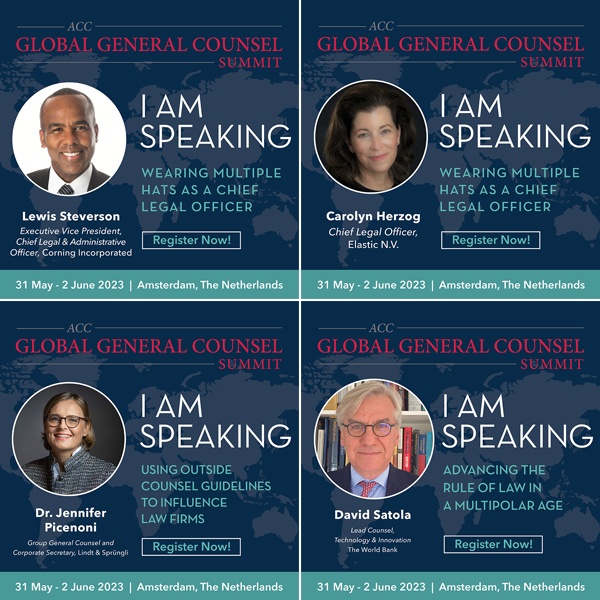It is often said that the speed of technological progress outstrips the law’s ability to keep pace. Nowhere is this more apparent than in the field of data protection and cybersecurity when almost daily reports of high-tech innovation contrast sharply with laborious and often ill-informed legislative debates over applicable and too frequently impractical regulatory frameworks. However tempting, putting forthcoming legislation at the bottom of a burgeoning in-tray can necessitate serious ‘catch-up’ when the rules come into force and risks missing opportunities to influence debate. Information on law developments affecting public and private sector organisations are myriad but in this article we’ve identified our top five – it could easily have been a top 15 – together with our thoughts on what in-house lawyers should consider.
Continue reading “Data protection and cybersecurity – what busy GCs need to know”
Learn, share, and connect with fellow general counsel from around the world at unique, timely conference
2023 Global General Counsel Summit
Presented by the Association of Corporate Counsel
31 May – 2 June, 2023
Amsterdam, The Netherlands
A globalised economy demands business leaders with an international mindset. The general counsel of today is a business leader, and as mitigators of risk they can often find themselves wearing multiple hats while they carefully navigate the wide variety of issues brought before them.
To help high-ranking global counsel excel at a truly global perspective and be best prepared for any challenge the current business landscape could throw their way, the Association of Corporate Counsel (ACC), a global legal association that promotes the common professional and business interests of in-house counsel, is inviting the highest ranking legal officer of an organisation to join their peers from around the world at the ACC Global General Counsel Summit.
Taking place in Amsterdam from 31st May to 2nd June 2023, the event will provide participants with a space (under the Chatham House Rule) to tackle the most pressing issues currently facing modern CLOs, learn from their peers, and make cross-border connections in a private, intimate setting designed for general counsel, by general counsel.
Summit attendees will receive:
- Peer-to-peer benchmarking on best practices and challenges;
- Networking with a multinational community of 20+ countries across various sectors;
- Global brainstorming to drive legal department transformation and growth; and
- Examination of the chief legal officer role and response during crisis simulations, and more.
What is the ACC Global Counsel Summit?
The theme of this year’s ACC Global General Counsel Summit is “Leading your company through a multipolar world” and has been designed by industry experts to inspire legal counsel to forge relationships that open their minds to new opinions, challenge their insights, provide fresh experiences, and teach them how to sustain connections. The Summit is the preeminent annual event aimed at chief legal counsel, encouraging them to gain the essential knowledge needed to navigate an increasingly complex business environment.
Chief legal officers from more than twenty countries will engage with leading global experts and speakers from The World Bank, Nestle, Uber, Heineken, and others, through sessions around numerous key topics, including:
- Rule of Law
- Supply chain management
- Recruiting & retaining talent
- Cybersecurity
- Post-merger integration
- Wearing multiple hats
- Addressing shareholder concerns
Why should legal counsel attend?

Carolyn Herzog, chief legal officer, Elastic
The need for global general counsel to easily adapt is more important than ever. In this current global landscape, legal officers must become even more agile and strategic to address their corporate clients’ needs. The role of the CLO is forever changing and expanding, and as the world’s organisations keep adjusting to new challenges, legal professionals must also continually and proactively redefine themselves and their legal departments to match this rapid global transformation.
“The theme of the conference is extremely compelling to me. Within my scope, like many of my peers, I manage functions outside of the traditional legal function, such as trade compliance, ethics and compliance and government affairs. We work in global environments where we must be cognizant of the multipolarity of conflicts of laws, and the current regulatory environment around key topics of interest such as cybersecurity, data privacy, ESG and corporate governance, as well as around certain areas of technology such as AI. Boards and executive leadership rely on the General Counsel to lead the discussion on these topics and the General Counsel relies on our peers and our external counsel to ensure we are on the right track.” – Carolyn Herzog, chief legal officer, Elastic.
Truly-effective general counsel will exploit these newfound opportunities, leading their companies as they navigate this complex and shifting environment. The Global General Counsel Summit featuring roundtables, interactive plenaries, and ample networking opportunities will provide legal professionals with the opportunity to learn from experts from around the world.
“In my opinion, the changing regulatory landscape and rising geo-political discord are two of the top challenges facing CLOs today. Generative AI and the intellectual property implications are an emerging challenge as well, however, AI also provides an opportunity to enhance products and services as well. I’m looking for an opportunity to meet my fellow CLOs and address the challenges of this ever-changing world. I’m also interested in understanding some of the best practices and challenges experienced by my peers.” – Steven Davis, chief legal officer, One Call Medical Inc.
What top challenges are modern CLOs facing?
Steven Davis, chief legal officer, One Call Medical Inc.
The modern CLO has a lot on their plate. From dealing with the effects of multipolar conflicts between regional blocs of countries, adapting policies to be in line with evolving social norms both inside and outside companies, and handling the pressing need to accomplish more with less spending, their list of responsibilities is rapidly expanding.
“I am certain that the networking and brainstorming will foster exactly the kind of ideas and outcomes that we all need to help us drive the kind of transformative scale and growth that we hope to bring back to our companies during this time when regulatory change is happening quickly and our companies need us to act as the bridge between law and culture more than ever before.” – Carolyn Herzog, chief legal officer, Elastic.
As the role of the CLO continues to expand, the position is increasingly being seen as critical to the success of any business, with those filling the role acting as valued and trusted partners throughout their organisations. The main topics concerning modern CLOs include cybersecurity, regulatory compliance and data privacy, with industry-specific regulations posing the greatest legal challenge, according to the 2023 ACC Chief Legal Officers Survey. Many CLOs are also facing many of the legal and business implications associated with the ongoing pandemic, the war in Ukraine, and inflation, acting as a driving force behind crisis management for many companies.
The value of CLOs applying their unique training and experience to roles outside the traditional legal function is increasingly being recognized as beneficial to the strategic and operational needs of organisations. Recent ACC surveys show increases across numerous corporate functions reporting to the chief legal officer. In 2022, we saw increases in 18 of 22 corporate functions surveyed that report to the CLO. In 2023, privacy, risk, and cybersecurity response saw 4 percent increases in the past year alone. It is more important than ever for general counsel to establish their influence throughout their organisation and their industry to make their mark beyond the typical confines of the legal department.
Seats are filling fast, act now to join this elite group of legal and business leaders in Amsterdam on May 31 – June 2 at the ACC 2023 Global General Counsel Summit. Register today!
Significant matters – Winter 2023
Firms reappointed to provide core legal services on FSCS’s panel
Eight law firms have been reappointed to provide core legal services on the Financial Services Compensation Scheme (FSCS) second legal panel, following a six-month procurement exercise. Continue reading “Significant matters – Winter 2023”
Major real estate investment structures in Japan
Introduction
A weak Yen and other factors continue to attract overseas investors to the Japanese real estate market. While this investment can take many forms, two of the most common financing structures are GK-TK and TMK (as defined in the graphics). J-REITs are often used for large-scale portfolios, but because of this structure’s longer timeline and complex setup, this article will focus on the GK-TK and TMK investment forms. We explain these two structures below.
Continue reading “Major real estate investment structures in Japan”
Overview of the exemptions from the new Swiss ESG due diligence and reporting obligations
In last year’s winter edition, we highlighted certain aspects of the new ESG rules in Switzerland, which have entered into force in January 2022. The first ESG reports according to the new Swiss rules must be published in 2024, covering the financial year 2023. This also means that the risk assessments and due diligence processes with respect to conflict minerals and metals (hereinafter referred to as ‘conflict minerals’) and child labour, and the required data collection, also with regard to the report on non-financial matters, must already be in place for 2023 – i.e., starting now. Unless one of the various exemptions applies, that is. Continue reading “Overview of the exemptions from the new Swiss ESG due diligence and reporting obligations”
The role of in-house counsel in ESG: a Kenyan perspective
In the recent past, the role of in-house counsel has evolved from the traditional and, you would be forgiven to say, reactive one where the legal person or team sprung into action only when needed. That is to say, when there was a dispute or other legal ‘problem’ for the organisation to solve.
Continue reading “The role of in-house counsel in ESG: a Kenyan perspective”
White-collar enforcement in Italy
During the pandemic, white-collar experts have not been as busy as they used to before. Has this also been the case in Italy?
G. Scassellati-Sforzolini: During the pandemic, enforcement authorities have mainly focused on combating fraud related to the health emergency and that did not come as a surprise. The restrictions implemented in Italy also impacted the ordinary activity of companies and authorities. However, as the economy rebounded, we have witnessed a ramp-up of criminal investigations, confirming that Italy remains a hub for white-collar crime enforcement.
Continue reading “White-collar enforcement in Italy”
Corporate governance in Saudi Arabia: an overview of the two most common types of corporate entities
Corporate governance has become an issue of increasing interest and importance in Saudi Arabia, as evidenced by the recent proliferation of corporate governance rules and the increasingly active involvement of regulators to ensure that the applicable rules are being applied. This article presents a general overview of corporate governance of the two most common types of corporate entities in Saudi Arabia.
Continue reading “Corporate governance in Saudi Arabia: an overview of the two most common types of corporate entities”
US DOJ’s renewed focus on individual prosecutions presses limits
In the United States, the Department of Justice (DOJ) is chiefly responsible for prosecuting white-collar crime. While white-collar enforcement significantly declined during the past presidential administration, current DOJ leadership has pledged to take a more aggressive approach. To that end, in September 2022, Deputy US Attorney General Lisa Monaco announced changes to DOJ’s corporate enforcement policies designed ‘to empower our prosecutors, to clear impediments in their way, and to expedite our investigation of individuals.’
Continue reading “US DOJ’s renewed focus on individual prosecutions presses limits”
‘Game-changers’– why in-house counsel must take ownership of ESG
‘You are all climate lawyers now.’ So declared John Kerry, the US special presidential envoy for climate, at the General Assembly of the 2021 American Bar Association hybrid annual meeting in Chicago. Fast forward to 2023, and the veracity of this statement far exceeds even Kerry’s predictions. Continue reading “‘Game-changers’– why in-house counsel must take ownership of ESG”
White-collar crime developments and trends in the UAE
As a federation of seven emirates, each with different leadership, economic circumstances and priorities as well as different (at least in part) legal and regulatory systems, the UAE presents significant complexity for government authorities and regulators when combatting money laundering (‘AML’) and other financial crime. In March 2022, the UAE was added by the Financial Action Task Force to an international list of jurisdictions which are considered to have weaknesses in their systems for combatting terrorism funding and money laundering (the ‘grey list’).
Continue reading “White-collar crime developments and trends in the UAE”
Prevention of corporate crimes as a compliance standard for Mexican companies
Since the inception of corporate criminal liability in Mexico in 2016, federal and state prosecutors have been increasingly active in pursuing both national and foreign-owned businesses for crimes as varied as money laundering, tax evasion and bribery. The legislation that was initially vague and challenging to interpret has, in the hands of regulators and by means of substantial legislative reforms, become a relatively sophisticated set of standards. At this stage in the maturity of the system, companies must take seriously the need to evaluate and adapt their compliance programmes to the expectations of Mexican enforcement authorities. In addition to avoiding criminal and other types of liability, adhering to these standards increases the value of companies in the market by making them more attractive both as business partners and as investment opportunities.
Continue reading “Prevention of corporate crimes as a compliance standard for Mexican companies”





